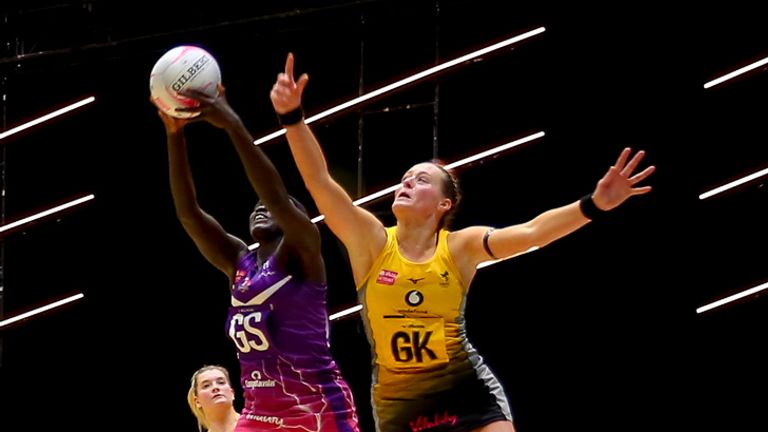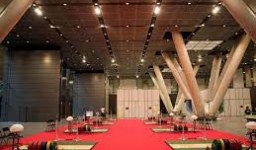
Tamsin Greenway
“I’m always looking for new ways to push our sport on, to keep on raising the bar and developing our game. In sport, you always need winners and losers, but as a product, you will always want it to be as competitive as possible”
Tamsin Greenway discusses how she believes the Vitality Netball Superleague can continue to develop and enhance its level of competition.
After 22 matches for the 2021 season, we’ve been able to see where every franchise is at, and it’s become clear that there’s a divide between the top teams and the bottom teams.
If you take a look at the numbers, the difference in goals at the end of matches highlights this. So far, there’s been an average of 16 goals between Superleague teams at the full-time whistle, and 14 matches have been won by a margin of greater than 10 goals.
Now, I’m aware that the ANZ Premiership has fewer teams, but if you compare the Superleague’s figures to the start of their season last year, the difference is clear. In New Zealand, only four of their first 22 games were won by 10 goals or more and their average margin was just seven goals.
Overall, what the figures show, is that there’s definitely still a way to go in terms of tightening up the Superleague and the teams within it. Over the years, and even recently, debates have risen as to how to achieve this.
The uncertainty of sport is what makes it as compelling as it can be – it’s why penalty shootouts in football, golden points in rugby league, and matches like England Netball’s Commonwealth Games victory over Australia, always live long in fans’ memories.
I don’t think you can manipulate close results, but if there are steps that the Superleague can take towards having more goal-for-goal matches, and games where the result is uncertain until the final minutes, then I’m all for it.
After speaking to Madi Browne about this during the latest episode of Off The Court, it got me thinking about some key elements which need to keep on being addressed, in order to continue making England’s domestic league stronger each season.
I know questions still exist around big issues like funding, fewer teams, relegation, and feeder leagues, but I actually think there’s a smaller part we can get stuck into right now.
First, intensity, and second, a nod towards professionalism, by providing the right support to franchises, players, and coaches.
For me, culture and intensity are two components that are linked. The standards that are being set and the attitude towards them will drive the Superleague’s intensity up.
So often we hear about players going to Australia or New Zealand and they then speak openly about the rise in intensity – I was one of those players. Every training session is incredibly challenging and being in those environments is what makes them a better player.
The end goal needs to be to bring that intensity level here and match it, so there’s not a jump, and Browne touched on this during Off The Court.
“When you look at the top teams in Superleague they have not only one but a couple of players who have maybe played in Suncorp Super Netball, for the Roses, or for other international teams,” she said.
“Those are the players that understand that intensity and drive. They understand the commitment that’s needed and that every time you get to training, it counts.
“It’s all about having that quality of training, and the consistent quality of training, that’s then replicating onto the court straight away.”
The question now is how to ensure that happens?
Now I realise that across the board, most players here aren’t employed as full-time athletes, but I’ve also worked with several players who have exceptionally tough working lives and yet they’ve remained at the very top of their game as an athlete.
This attitude spreads quickly through the team environment and puts pressure on those around them to find ways to do the same. However, to be able to do this both the clubs and the players need to continue to be guided and supported in all aspects of their programmes.
Every franchise or team has a different background and set up, so for example Team Bath Netball and Loughborough Lightning have access to great resources and recruitment through their link with their respective universities. Manchester Thunder are an independent team, but have, and continue to have, arguably the best youth development programme and junior leagues in the country.
But you’d be amazed at the huge range of differences across the clubs in terms of access to players, facilities, coaches and funding.
Whilst I was at Storm, the support from the university was great, but the recruitment was difficult. How do you provide a full-time netball programme that sits within players working lives, for athletes who are scattered over five different counties?
Whilst at Wasps we had players travelling over three hours to get to training, and who were linked to three universities. So the programme was condensed to three days and overnight stays, with players taking unpaid leave [to be there] and some weeks, there were only three or four players at certain sessions.
Now, with Scotland other challenges have arisen; their competition at domestic and university level means that some players are getting little or no match play throughout a season.
New Zealand have seemingly combatted this; standardisation and opportunities are given to all players. Of, course professionalism has helped. However, the culture in New Zealand has also shifted, with Dame Noeline Taurua, head Coach of the Silver Ferns, demanding certain expectations.
During selection for the recent Constellation Cup, she sent five players home who didn’t meet the fitness levels she has set. This has been followed up with calls to their domestic clubs.
“The idea [around the call] is to be very clear around the targets,” she said in Stuff NZ.
“What is the support in and around that person and how are we going to shift them so consistently there is no issue around meeting those fitness targets?”
Over here we have a full-time England Vitality Roses programme, which has undoubtedly created huge opportunities on the international stage, but what about those on the domestic front?
The Roses programme allows players to centralise in Loughborough and gives them support in all areas including S&C, conditioning, analysis, tactical, technical, medical, psychological and nutrition. However, the players are taken from their club environments for long periods of time and are getting so much more than a ‘regular’ Superleague player.
With a whole heap of impressive youngsters taking to the Superleague court this season, having these key players around to train within more localised programmes, could be beneficial?
Going back to where we started, is it any coincidence that the top four teams sitting in the league table at the moment have 19 players between them that, have been or are involved in, the full-time programme or have spent time overseas, compared to just six players in the bottom four?
If we can’t replicate identical programmes across the board, can we start to work with the teams and players on a more individual basis, through their clubs, schools, universities, and workplaces?
The idea would be to standardise the level required and get everyone on a level playing field? Can we learn from each other, take what works in some franchises, look at what extra support each needs and build together?
I’m always looking for new ways to push our sport on, to keep on raising the bar and developing our game. In sport, you always need winners and losers, but as a product, you will always want it to be as competitive as possible.
Sky Sports is your home of netball. The Vitality Netball Superleague continues on March 12 with Round Five and two matches back-to-back on Sky Sports Mix and streamed on the Sky Sports YouTube channel from 5pm.















Leave a comment
[wpqa_login]